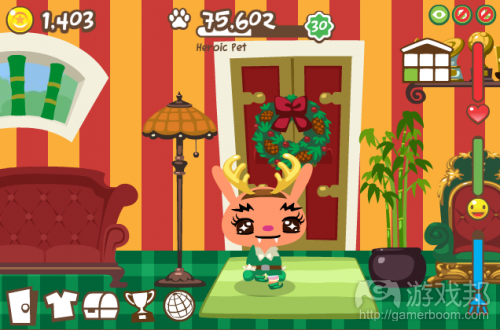社交游戏礼物馈赠机制应融入现实含义
作者:Robin Yang
我之前曾谈及社交网络游戏和“社交”游戏之间的区别,前者是指搭载诸如Facebook之类社交网络平台的游戏,后者是指使用社交互动元素刺激玩家游戏决策和活动的游戏。
下面就来谈谈礼物馈赠机制。
Facebook的赠送礼物机制在游戏尚未在该平台风靡前就已产生。这个机制源自Slide Inc.的《SuperPoke!》(游戏邦注:在该游戏中,玩家能够“抛小绵羊”、“双手击掌”或者向社交网络发送GIF/JPG图像,同时搭配有趣话语)和Facebook自有付费应用Gifts(用户支付1美元,便能够在好友墙发送配有信息的虚拟礼物)。
虽然有点病毒式传播的意味,但这丝毫不同于我们现实生活中的礼物赠送。
在现实生活中,内在刺激因素是我们赠送礼物的基础。我们会出于多种原因赠送礼物,或庆祝生日,或庆祝周年纪念、假日,或出于促销目的,或者其他转折性成就,但礼物背后的意义都是一样的。
礼物的成本就是些许金钱,但更重要的是,它会让我们思考同赠送对象之间的关系。我们通常会赠送我们认为有用的物品,这个物品会让接受者想起我们。赠送礼物不是出于想要获得回赠,我们赠送礼物并不是为了让对方在下次我们生日的时候回赠东西。赠送礼物是为了表示感谢或者祝贺,对于接受者来说,这还代表某种亲密关系。
但Facebook馈赠机制的运作方式与此大不相同。
Facebook游戏赠送礼物的成本很低,玩家只消在方框中选择赠送物品,过程非常随意(你上次选择物品赠送好友是什么时候?)。不仅如此,很多时候玩家都会将礼物同时发给20个好友。
附着于这些礼物的信息更是惊人:“这个XX东西送给你。能否请你回赠我其他东西?”在现实生活的互动中,这根本无法接受。表达含蓄回赠意思说得过去(游戏邦注:虽然这有点俗气)。直白表示“请回赠我东西”很少见。而且我们赠送礼物的原因大多是受游戏提示,很少是因为好友取得某种成就,或者发生什么值得庆祝的事件。
游戏是罪魁祸首。赠送不再留有现实生活的意味,而多半像是提供“诱导性毒药”。游戏使用礼物不是为了提醒好友我们有多关心或想念他,而更多是诱导好友参与游戏,或贿赂他们回访游戏。
我印象中没有一款游戏的“馈赠”机制同现实生活类似,除《宠物社区》类游戏之外,此类游戏除提供免费游戏外,玩家还可以选择“购买”商店道具,赠送给好友。
那么如何促使社交游戏馈赠机制运作得更好?
–在玩家晋级时提醒他们向好友赠送礼物,反之亦然。“Robin刚刚晋升新等级,快来收集钱币!”可以换作“Robin刚刚完成X任务,送个礼物表示祝贺吧!”
–在馈赠活动中引入稀缺概念。限制玩家每天能够赠送的礼物数量。想想Gmail测试版馈赠机制的珍贵之处?
–玩家赠送礼物需相应“放弃”某些东西。游戏不要让玩家免费赠送礼物,玩家只有完成某任务换取相应礼物,方能展开赠送活动(游戏邦注:不同于完成任务获得个人物品,然后向好友赠送“免费礼物”模式)。(本文为游戏邦/gamerboom.com编译,如需转载请联系:游戏邦)
Broken Social Game Scene: Why Gifting is Broken
By Robin Yang
This Broken Social Game Scene series tries to look at why most current social games break usual social norms and suggests a few things we can do to fix it!
In the previous post, I talked about the distinction between Social Network games and ‘social’ games — the former being a game that is accessible through a social network service such as Facebook, the latter being a game that attempts to use elements of social interaction to motivate the player’s decisions and actions in the game.
The next few posts will examine the purportedly ‘social’ features of most Social Network games that fail to produce meaningful social interactions, offer some examples of games that are culprits, some counterexamples of games that are doing it right!, and some general thoughts on how maybe we can fix the social gaming scene on social networks (because really, there’s so much more to be done with the social graph than has been!)
So, gifting.
Gifting on Facebook originated way before games ever became popular on the platform. I like to think that the inspiration those later games used originated somewhere between Slide Inc.’s SuperPoke! app (friends would ‘throw sheep’, ‘high-five’ or otherwise send free GIFs/JPGs with cute sayings to their social network) and Facebook’s own monetized Gifts app (pay $1.00 to send a virtual gift to your friend’s wall with a message).
Though extremely viral, neither of those things really scratch the surface of what we mean in real-life when we give another person a gift.
In real-life, intrinsic motivators are the basis for much of our gift-giving. We gift for a lot of reasons, to celebrate birthdays, anniversaries, holidays, promotions, other life-changing accomplishments etc, but the mechanics behind meaningful gifts are usually the same… (generalized here, of course)
The cost of the gift to us, the givers, is some monetary value, but more importantly, it also requires thought and reflection on the relationship we have to the receiver. We give something that we think will be useful, that the item is something you’ll remember us for later. The gesture doesn’t explicitly state that reciprocity is required — we’re not giving you a gift so that you’ll get us something nice next time we have a birthday. It’s to show appreciation or congratulations, and to the receiver, it should signify kinship.
However, when we look at gifting systems in most social games on Facebook, it’s clear that different mechanics are in play.
On Facebook games, the cost to give a gift is very low – the effort it takes is selecting an item on a grid, and rather indiscriminately at that (when was the last time you thought about which item you were going to send someone?). Not only that, but a lot of the time, these gifts are being sent en masse, to 20 of your friends at the same time.
The messages attached to these gifts is even more shocking — “Here’s an X for you. Would you please help me by sending something back?” In terms of real-life social interaction, this would be completely unacceptable. Implied reciprocity is okay (although tacky). Plainly stated requests to ‘give me something back,’ not so much. And not only that, the reason we are sending gifts all over the place to one another is because we’re prompted to through the game — rarely because that friend has accomplished something great, or is celebrating.
Pretty much every game is a culprit here; it seems that gifting is less about what that term refers to in real life and more like offering ‘gateway drugs’. Games use gifts not necessarily to remind a friend of how much we care or think of them, and more as a hook to introduce them to a game, or bribe them to return to a game.
Off of the top of my head, I don’t remember having played a game that uses the ‘gifting’ terminology to indicate a function closer to how we gift in real-life, save for games in the Pet Society genre where, alongside free gifts, you can also ‘buy’ shop items and send them to friends. If you have examples, please please link them in the comments — I’m sure they exist but I haven’t found them yet.
So what are some ways gifting in social games could work better?
- Prompt users to send gifts to friends when they have leveled up, NOT the other way around. “Robin just leveled up, collect coins!” could easily be “Robin just completed X Quest – send a gift to congratulate her!”
- Introduce the notion of scarcity in gifting. Possibly limit the number of gifts a user can send each day. Remember how valuable Gmail beta invites were?
- Make the user have to ‘give up’ something in order to send a gift. Instead of making gifts free to send, maybe the user receives the ability to send a particular gift only after completing a task specific to gaining that gift (versus completing a quest for personal gain and sending out ‘free gifts’ as an afterthought).
Next time, why your neighbors’ calls for help are fake and Helping is broken.(Source:loadingloading)
下一篇:分析人士称社交游戏滥用外部奖励









































 闽公网安备35020302001549号
闽公网安备35020302001549号